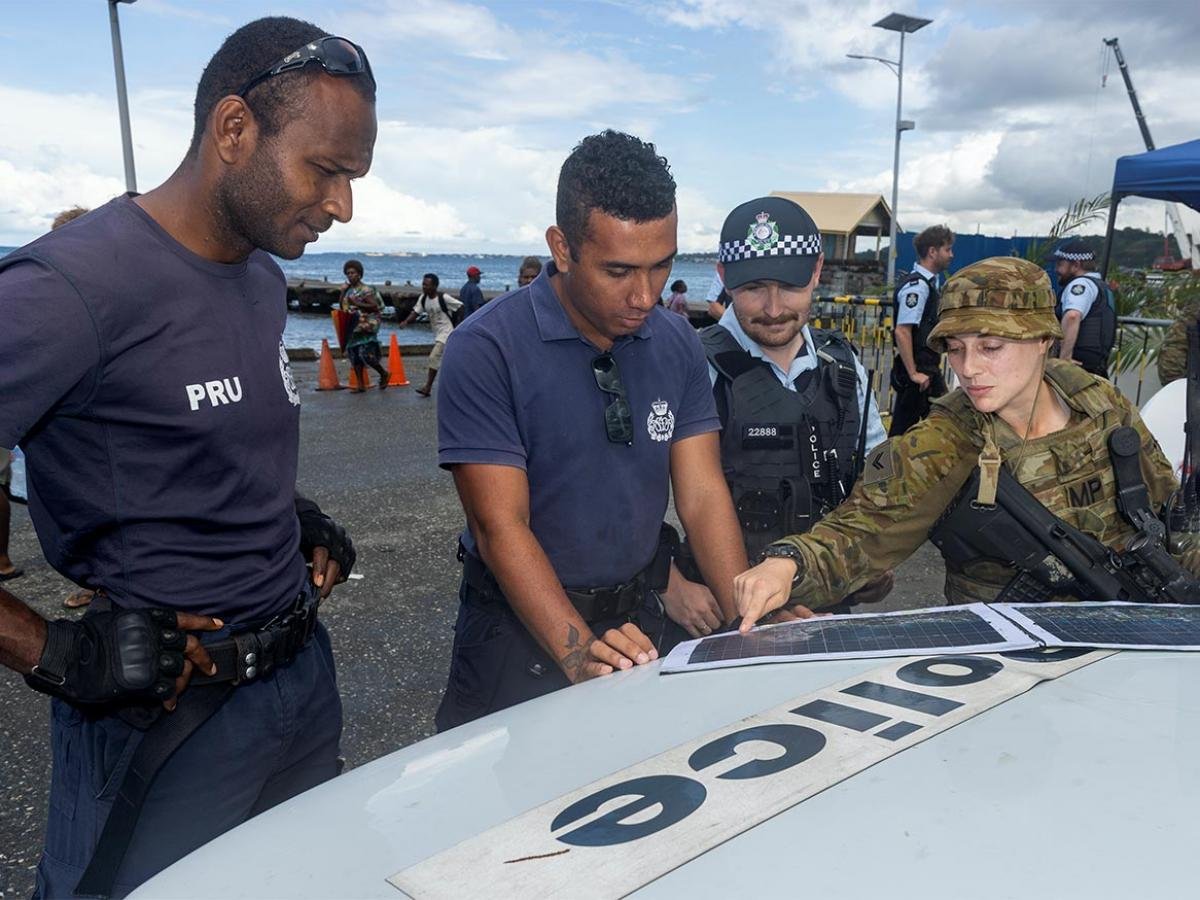
Pacific security cooperation
A networked security architecture in the Pacific: Implications for Australia (Defence Strategic Policy Grant 2020-106-040, 2020-2022)
With funding from an Australian Department of Defence Strategic Policy Grant, between 2020 and 2022, an international team of researchers (Henrietta McNeill, James Batley, Anna Powles, Alan Tidwell, and Hidekazu Sakai) led by the Stretton Institute Security Policy in the Indo-Pacific research program director Professor Joanne Wallis analysed the various cooperative security agreements, arrangements, and institutions between and among states and territories in the Pacific Islands region, and their partners. The aim of the project was to identify how Pacific security cooperation could be best orientated to address current and future regional security challenges.
Politics, Priorities and Pathways of the Regional Security Patchwork
Our major output from the project was an edited book titled Security Cooperation in the Pacific Islands: Politics, Priorities and Pathways of the Regional Security Patchwork. In this book we and our contributors examine the dynamics of Pacific Islands’ security cooperation, analysing how it helps address regional security challenges amid the broader strategic competition between China and the United States that is increasingly playing out in the region.
Mapping Security Cooperation in the Pacific Islands
The first major project output was a policy paper titled Mapping Security Cooperation in the Pacific Islands . This paper identified and mapped the various cooperative security agreements, arrangements, and institutions between and among states and territories in the Pacific Islands region, and their partners.
This policy paper was accompanied by an animated map .
Members of the project team shared the map and research findings in an opinion piece about regional security cooperation.
The Dynamics of Security Cooperation in the Pacific Islands
The second major project output was a policy paper titled Security Cooperation in the Pacific: Workshop Report .
This paper was based on an online workshop held online on 18 and 19 November 2021 to better understand security cooperation between partner states; between Pacific Island countries themselves, and their citizens; and between partners, Pacific Island countries and their citizens.
Speakers came from a range of PICs and partner states, including Australia, China, Fiji, Japan, New Caledonia, New Zealand, Papua New Guinea, Samoa, Solomon Islands, and the United States. The Pacific Islands Forum Secretariat also attended part of the workshop as an observer.
Security cooperation in the Pacific Islands: architecture, complex, community, or something else?
The third major project output was an article in International Relations of the Asia-Pacific in which we address the question: is there a security architecture in the Pacific Islands, or does security cooperation take a different shape?
We found that security cooperation in the region does not constitute a security architecture, as there is no ‘overarching, coherent and comprehensive security structure for a geographically-defined area’. We also find that the region is neither a security complex nor a community, due to the extensive involvement of metropolitan powers and external partners.
Instead, we argued that security cooperation in the Pacific Islands is best described as a patchwork of bilateral, minilateral, and multilateral, formal and informal agencies, agreements, and arrangements, across local, national, regional, and international levels.
Workshop on security cooperation in the Pacific Islands
The fourth major project output was a policy paper titled Navigating 'Flexible, Responsive and Respectful' Security Cooperation in the Pacific Islands: A 2022 Workshop Report.
This paper was based on a workshop we convened on 23 and 24 November 2022 featuring speakers from across the Pacific Islands, Australia, New Zealand, the United States, Japan, and France, to discuss the dynamics of security cooperation in the Pacific Islands and formulate proposals for how cooperation may best be orientated to address current and future regional security challenges. View the workshop program here.
Pacific maritime security cooperation
With funding from another Defence Strategic Policy Grant, between 2024 and 2024 a team of 13 researchers from Australia, across the Pacific Islands region, and major partner countries are seeking to answer the following questions:
How can Pacific countries and their partners best target and coordinate maritime security assistance?
How can expertise, relationships, and issue-based partnerships develop?
What are the consequences for Defence’s partnerships and policymaking?
Pacific maritime security cooperation: views from the Pacific and its partners
Our first project output is a set of 13 papers that examines what maritime security means in the Pacific Islands region and what maritime security mechanisms exist and what forms of assistance partners are providing in the region.
Pacific maritime security cooperation StoryMap
The Pacific Maritime Security Cooperation StoryMap is an interactive online database that provides an accessible point of entry to understand how Pacific Island countries and their partners are cooperating to respond to opportunities and challenges in the maritime domain.
The Pacific Maritime Security Cooperation StoryMap is a living document that will be updated throughout 2025 and 2026.
Pacific maritime security cooperation: partnerships, priorities, and possibilities
Our third project output is a policy paper in which our team makes initial policy proposals concerning the following Pacific maritime security issues:
- Responding to geopolitical competition;
- Legal and regulatory environment;
- Fisheries cooperation;
- Transnational crime; and
- Humanitarian assistance and disaster relief.
We also make initial policy proposals for how the following partner countries can enhance their maritime security assistance and cooperation in the Pacific Islands region:
- Australia;
- New Zealand;
- The United States;
- France;
- Japan and South Korea;
- India; and
- China
Acknowledgement
These activities were supported by the Australian Government through a grant by the Australian Department of Defence. The views expressed herein are those of the authors and are not necessarily those of the Australian Government or the Australian Department of Defence.


